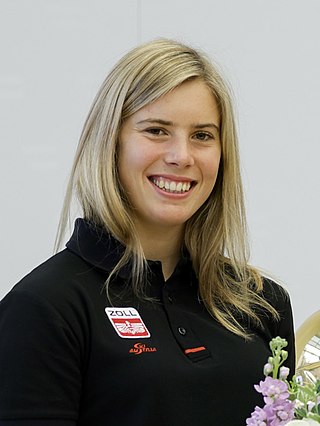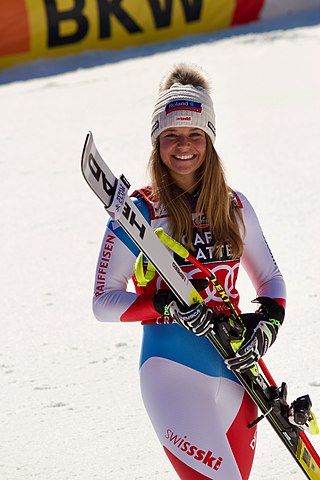
The men's slalom in the 2018 FIS Alpine Skiing World Cup involved 11 events, including two parallel slaloms. The last race, at the World Cup finals in Åre, was cancelled due to high winds.

The International Ski Federation (FIS) Alpine Ski World Cup was the premier circuit for alpine skiing competition. The inaugural season launched in January 1967, and the 2018–19 season marks the 53rd consecutive year for the FIS World Cup.

The International Ski Federation (FIS) Alpine Ski World Cup, the premier circuit for alpine skiing competition, began in January 1967, and the 2019–20 season marked the 54th consecutive year for the FIS World Cup. As it had every year since 2006, the season began in Sölden, Austria in October. The season was supposed to end with the World Cup finals in March, which were to be held in Cortina d'Ampezzo, Italy for the first time since they began in 1993, but the finals were cancelled due to the COVID-19 outbreak in Italy.

The International Ski Federation (FIS) Alpine Ski World Cup was the premier circuit for alpine skiing competition. The inaugural season launched in January 1967, and the 2020–21 season marked the 55th consecutive year for the FIS World Cup. As it had every year since 2006, the season began in Sölden, Austria in October, and it ended with the World Cup finals in March, which were held in Lenzerheide, Switzerland. However, the COVID-19 pandemic forced many changes to the original racing schedule. Among them were the following:

The men's slalom in the 2021 FIS Alpine Skiing World Cup involved 11 events including the final, exactly as scheduled without any cancellations.

The women's slalom in the 2021 FIS Alpine Skiing World Cup consisted of 9 events, as planned.

The men's giant slalom in the 2021 FIS Alpine Skiing World Cup involved ten events, as scheduled.

The men's parallel competition in the 2021 FIS Alpine Skiing World Cup involved only 1 event, a parallel giant slalom, due to the COVID-19 pandemic. Three additional parallel events, scheduled for Alta Badia, Davos, and Chamonix, were cancelled prior to the start of the season.

The men's downhill in the 2020 FIS Alpine Skiing World Cup consisted of nine events, with only one cancellation from the scheduled ten.

The men's super-G in the 2020 FIS Alpine Skiing World Cup involved six events, as the last two scheduled Super-Gs were canceled.

The men's giant slalom in the 2020 FIS Alpine Skiing World Cup involved seven events, as the last two scheduled giant slaloms in the season were cancelled.

The women's downhill in the 2020 FIS Alpine Skiing World Cup involved 8 events, with only one canceled.

The women's slalom in the 2020 Alpine Skiing World Cup involved 6 events, although there were 9 originally scheduled.

The International Ski Federation (FIS) Alpine Ski World Cup was the premier circuit for alpine skiing competition. The inaugural season launched in January 1967, and the 2021–22 season marked the 56th consecutive year for the FIS World Cup.

The men's slalom in the 2022 FIS Alpine Skiing World Cup consisted of ten events including the final. However, the slalom scheduled in Zagreb on 5 January was first delayed until 6 January due to bad weather and then cancelled in the middle of the first run due to additional bad weather, leading to its removal from the schedule. Eventually, however, it was rescheduled for Flachau on 9 March, restoring the season to 10 events.

The International Ski Federation (FIS) Alpine Ski World Cup was the premier circuit for alpine skiing competition. The inaugural season launched in January 1967, and the 2022–23 season marks the 57th consecutive year for the FIS World Cup.

The men's slalom in the 2019 FIS Alpine Skiing World Cup involved 12 events, including two parallel slaloms (both city events}. Marcel Hirscher of Austria won his sixth championship in the discipline, all in the prior seven years, on the way to his eighth straight overall men's championship. During the season, Hirscher had hinted at retiring after it, and before the start of the next season, he did announce his retirement.

The men's slalom in the 2023 FIS Alpine Skiing World Cup consisted of ten events, including the discipline final.

The men's slalom in the 2017 FIS Alpine Skiing World Cup involved 11 events, including one parallel slalom. The last race of the season was at the World Cup finals in Aspen, and Marcel Hirscher of Austria won his fourth championship in the discipline, all in the prior five years, on the way to his sixth straight overall men's championship.

The men's slalom competition in the 2016 FIS Alpine Skiing World Cup involved 11 events, including one parallel slalom. However, the city event was moved from Munich on 1 January to Stockholm on 23 February due to organization issues. The last race of the season was at the World Cup finals in St. Moritz.
















